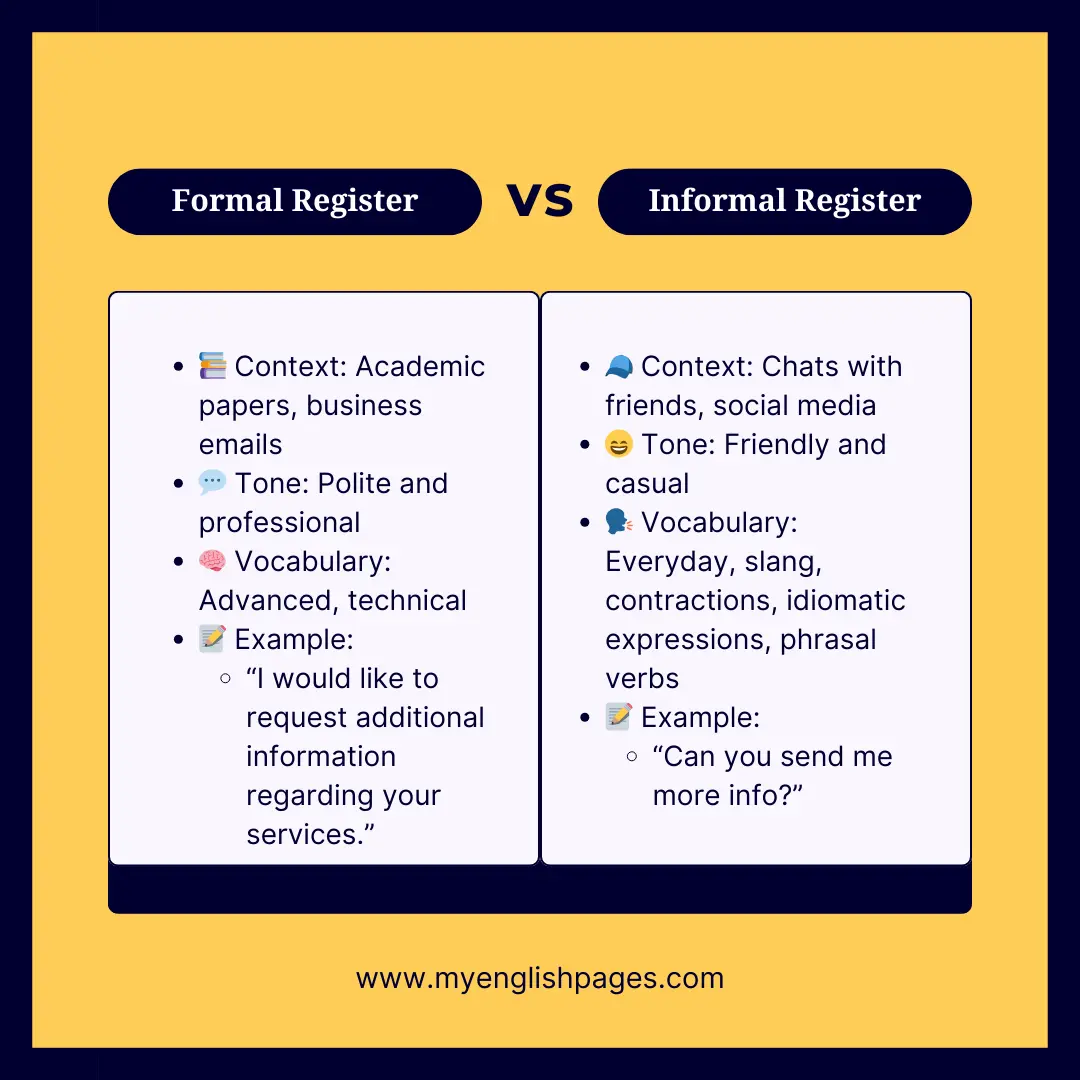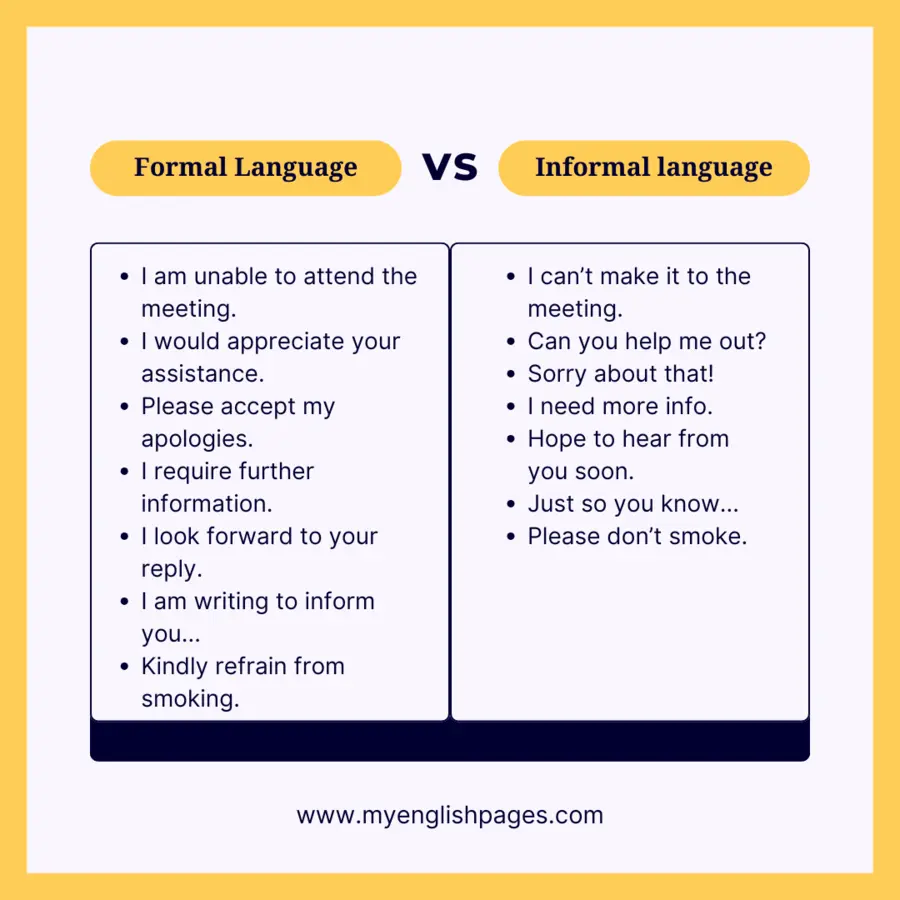Table of Contents
When learning English, it’s not just about vocabulary and grammar—you also need to understand register. The way we speak or write changes depending on who we’re talking to, why we’re communicating, and what the situation is.
This is where understanding the difference between formal and informal register becomes important.
In this post, we’ll explain what register is, how to identify formal and informal language, and when to use each type appropriately.
What Is a Language Register?
A register refers to the level of formality or informality in the language we use. We change our register based on context—whether we’re at a job interview, chatting with friends, writing an academic essay, or posting on social media.
In English, we typically distinguish between:
- Formal register
- Informal register
Understanding this difference helps learners sound more natural and polite in different situations.
Formal vs Informal Register
Before we explore the difference between formal and informal register, let’s first understand what a language register is.
What is a Language Register?
A register is the way we use language depending on who we’re talking to and the situation we’re in.
The way you speak in a formal setting, such as when addressing an important figure like the President of the United States, is very different from how you speak in a casual or informal setting, like chatting with your closest friend.
- → In an informal setting, you might say:
- “What’s up? How was your day?”
- → But in a formal setting, you would say something more polite and structured, such as:
- “Good afternoon. I hope you’re having a pleasant day.”
- “It’s a pleasure to meet you. How have you been?”
This difference in tone, word choice, and structure is called register, and adjusting your register to suit the situation is a key part of effective communication in English.
What Is Formal Register?
Formal register is used in serious, official, or professional situations. It is common in:
- Academic writing
- Business emails
- Official speeches
- News reports
- Some essays
Characteristics of Formal Register:
- More complex sentence structures
- Polite and respectful tone
- No contractions (e.g., “cannot” instead of “can’t”)
- Use of full words (e.g., “television” instead of “TV”)
- Specific vocabulary and jargon
Example:
“I am writing to inform you about the upcoming meeting scheduled for next Friday.”
Rules of Formality in English
- Avoid contractions
- ✓ I am / We will
- ✗ I’m / We’ll
- Use full words and standard grammar
- ✓ Do not / Because
- ✗ Don’t / ‘Cause
- Spell out whole numbers from one to ten
- ✓ Three students attended the meeting.
- ✗ 3 students attended the meeting.
- Avoid slang and informal expressions
- ✓ Extremely tired / Exhausted
- ✗ Dead tired / Wiped out
- Use more complex or precise vocabulary
- ✓ Purchase / Request / Assist
- ✗ Buy / Ask for / Help
- Minimize the use of phrasal verbs
- ✓ Investigate
- ✗ Look into
- Use passive voice appropriately (not excessively)
- ✓ The proposal was approved by the committee.
- ✗They said yes to the proposal.
(Passive voice is common in formal writing but should not be overused.)
- Use respectful and polite forms
- ✓ Would you mind…? / I would appreciate it if…
- ✗ Can you…? / I want you to…
- Avoid emojis and exclamation marks
- ✓ I look forward to your response.
- ✗ Talk soon! 😊
- Use titles and surnames when appropriate
- ✓ Dear Mr. Johnson
- ✗ Hey John
What Is Informal Register?
Informal register is used in casual or friendly situations. It’s common in:
- Conversations with friends or family
- Personal letters and text messages
- Social media posts
Characteristics of Informal Register:
- Simple, direct sentences
- Use of contractions (e.g., “I’m,” “don’t”)
- Slang or idiomatic expressions
- Friendly or relaxed tone
Example:
“Just wanted to let you know we’ve got a meeting next Friday.”
Language Features Tolerated in Informal Language (with Examples)
- Contractions
- I’m, don’t, we’re, she’ll
- Example: I’m not sure if she’ll come tonight.
- I’m, don’t, we’re, she’ll
- Slang and Colloquialisms
- Cool, awesome, dude, chill, hang out
- Example: That party was awesome!
- Cool, awesome, dude, chill, hang out
- Idioms and Figurative Expressions
- Break the ice, hit the sack, piece of cake
- Example: I’m gonna hit the sack. I’m tired.
- Break the ice, hit the sack, piece of cake
- Shortened or Abbreviated Words
- TV, info, pics, fridge
- Example: Can you send me the pics later?
- TV, info, pics, fridge
- Phrasal Verbs
- Give up, pick up, hang out, look after
- Example: We’ll hang out after school.
- Give up, pick up, hang out, look after
- Simple or Casual Vocabulary
- Kids instead of children, guy instead of man
- Example: The kids are playing outside.
- Kids instead of children, guy instead of man
- Use of Emojis or Emoticons (in writing)
- 😊 😂 😎
- Example: I loved it! 😂
- 😊 😂 😎
- Grammatical Flexibility or Mistakes (often overlooked)
- Me and my friends went to the mall. (instead of My friends and I…)
- Examples:
- Ain’t used instead of isn’t/aren’t
- She ain’t coming today.
- Examples:
- Me and my friends went to the mall. (instead of My friends and I…)
- Direct Questions and Commands
- Example: What’s up? / Come here! / Tell me!
- Repetition and Fillers
- Like, you know, I mean
- Example: So, like, I was just sitting there, you know?
Formal vs Informal Register: Key Differences
| Feature | Formal Register | Informal Register |
|---|---|---|
| Tone | Polite, professional | Casual, friendly |
| Vocabulary | Academic or technical | Colloquial, everyday words |
| Grammar | Full forms, passive voice, complex sentences | Contractions, phrasal verbs |
| Context | Business, academics, ceremonies | Friends, texting, casual conversations |

When to Use Formal or Informal Language
→ Use formal register when:
- Writing essays, reports, or official letters
- Speaking at formal events or interviews
- Addressing someone you don’t know well
→ Use informal register when:
- Chatting with friends or family
- Sending casual texts or emails
- Commenting on social media
Understanding context is key. If in doubt, starting more formally and adjusting later is safer.

Practice Activity: Match the Expressions
This exercise will help you understand the difference between formal and informal language.
Match the formal expressions on the left with their informal equivalents on the right.
| Formal | Informal |
|---|---|
| 1. I would like to apologize | A. Sorry |
| 2. I am writing to inform you | B. Just so you know |
| 3. I am unable to attend | C. I can’t make it |
| 4. I would be grateful if you could | D. Can you…? |
| 5. I appreciate your assistance | E. Thanks for helping out |
| 6. I look forward to your reply | F. Hope to hear from you soon |
| 7. Please accept my apologies | G. My bad |
| 8. I regret to inform you | H. Sorry, but I’ve got bad news |
| 9. I require further information | I. I need more info |
| 10. I am delighted to inform you | J. Great news! |
| 11. I will contact you shortly | K. I’ll get in touch soon |
| 12. Thank you for your cooperation | L. Thanks for working with me |
| 13. I would like to request | M. Can I ask for…? |
| 14. I sincerely hope | N. Really hope |
| 15. Kindly refrain from | O. Please don’t |
1. I would like to apologise → A. Sorry
2. I am writing to inform you → B. Just so you know
3. I am unable to attend → C. I can’t make it
4. I would be grateful if you could → D. Can you…?
5. I appreciate your assistance → E. Thanks for helping out
6. I look forward to your reply → F. Hope to hear from you soon
7. Please accept my apologies → G. My bad
8. I regret to inform you → H. Sorry, but I’ve got bad news
9. I require further information → I. I need more info
10. I am delighted to inform you → J. Great news!
11. I will contact you shortly → K. I’ll get in touch soon
12. Thank you for your cooperation → L. Thanks for working with me
13. I would like to request → M. Can I ask for…?
14. I sincerely hope → N. Really hope
15. Kindly refrain from → O. Please don’t
FAQs About Formal and Informal Register
What is the difference between a formal and informal register?
A formal register is used in serious, official, or professional situations and follows strict rules of grammar, tone, and vocabulary. An informal register is used in casual settings and is more relaxed, often including contractions, slang, and simpler sentence structures.
What is an example of a formal register?
A formal register example:
– “I am writing to inform you that your application has been approved.”
This would be appropriate in a business or official context.
What is the difference between formal and informal language?
Formal language is more structured and polite, often used in academic or professional communication. Informal language is more relaxed and conversational, typically used with friends or in everyday settings.
What is the difference between formal and informal introductions?
A formal introduction might be:
– “Good morning. My name is Sarah Thompson. It’s a pleasure to meet you.”
An informal introduction might be:
– “Hey, I’m Sarah. Nice to meet you!”
What are examples of formal and informal sentences?
Formal: I regret to inform you that we must cancel the meeting.
Informal: Sorry, we have to cancel the meeting.
What is the difference between a formal and informal report?
A formal report follows a structured format with sections like an introduction, methodology, and conclusion. An informal report may be a simple memo, email, or summary, using less technical language and formatting.
What does it mean to be informal?
To be informal means to behave or speak in a casual, relaxed way. In terms of language, it involves using everyday vocabulary, contractions, and colloquial expressions.
What is the difference between formal and informal definitions?
A formal definition gives a precise and standardized meaning, often used in academic or technical contexts. An informal definition explains something in a simpler, more conversational way.
Conclusion
Knowing when to use formal vs informal register is an essential communication skill in English. It helps you sound more appropriate in different situations.
Practice identifying both registers in real-life situations, and don’t be afraid to adjust your language as needed. It’s all part of becoming a confident English speaker and writer.
Want more practice? Try writing the same email in both a formal and informal register. See how the tone and word choice change!
External Link: Formal and Informal Language


